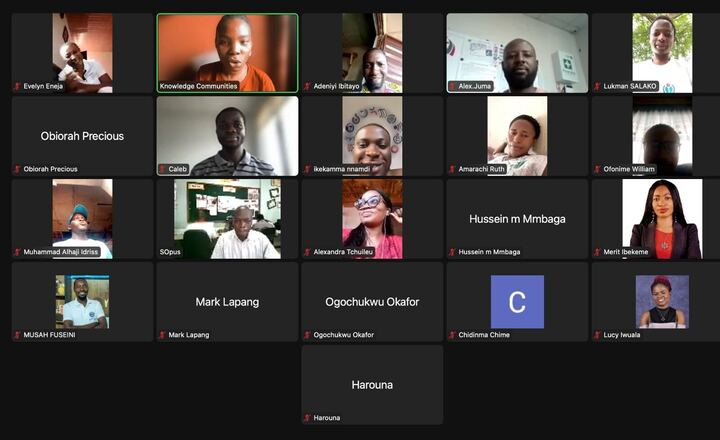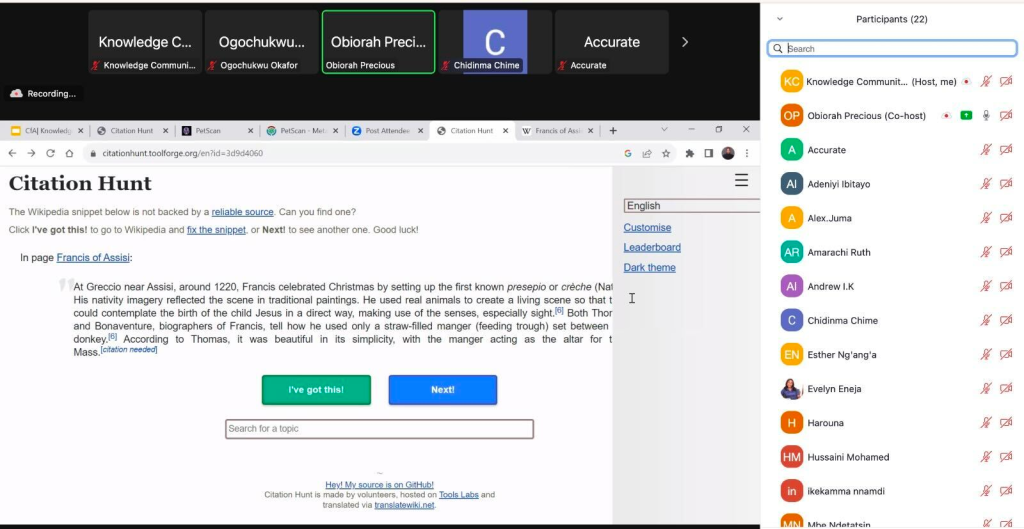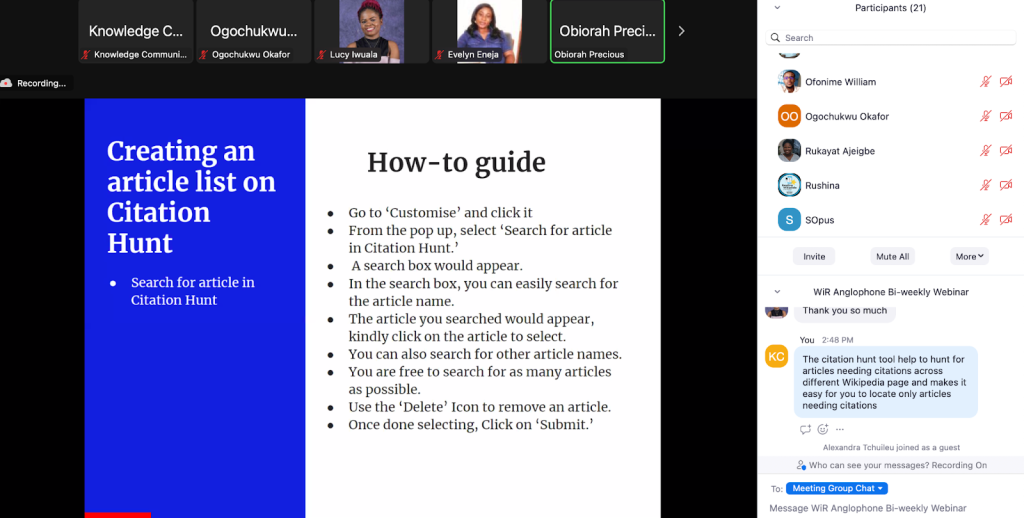Code for Africa (CfA) continues its dedicated mission to empower the Wikimedian-in-Residence (WiR) community through its bi-weekly webinar series. The fourth webinar held on 18 August 2023 had 24 African Wikimedians from Cameroon, Kenya, Nigeria, Tanzania, and Uganda. The webinar was led by Precious Obiorah, co-founder of Wiki fact-checkers, and adeptly facilitated by Bukola James, CfA’s WiR community coordinator, to shine a spotlight on the indispensable “Citation Hunt tool.”

Why Citations Matter on Wikipedia
In the academic and digital world, citations are the bedrock of credibility. This is especially crucial in regions like Africa, where scepticism regarding the reliability of Wikipedia still lingers within academic and professional circles. The Citation Hunt tool emerges as a saviour, identifying articles lacking proper citations and providing a straightforward pathway to rectify these shortcomings.
The essence of citations on Wikipedia can be distilled into two key facets:
- Enhancing Credibility: Each claim on Wikipedia requires verification, and reliable citations serve this purpose, lending authenticity to the content.
- Building Trust: For readers and contributors, seeing a well-cited article bolsters trust in the information presented, especially in areas or topics that may be controversial or unfamiliar

Deep Dive: Features of Citation Hunt
The Citation Hunt tool offers a range of innovative features tailored to simplify the process of identifying and adding citations on Wikipedia with the following features:
- Customise: The ‘Customise’ feature provides users with the flexibility to tweak and adjust the interface based on their personal preferences. This adaptability ensures a user-centric experience, allowing editors to tailor their citation-hunting journey to their specific needs.
- Leadership Board: Transforming the editing experience into a competitive yet collaborative endeavour, the ‘Leadership Board’ showcases top contributors in terms of citations added. This gamified feature motivates users to contribute more actively, while also acknowledging and celebrating the efforts of the top citation hunters.
- Dark/White Theme: Recognising that users have diverse reading preferences, this feature offers the flexibility to toggle between a dark and white theme. Whether editing at night or during the day, users can choose a theme that is easy on the eyes, promoting longer, more comfortable editing sessions.
- Select Your Preferred Language: Catering to Wikipedia’s global community, this feature empowers users by allowing them to work in their preferred language. Given the multilingual nature of Wikipedia’s readers and editors, this feature ensures that language isn’t a barrier to contributing quality citations.
Benefits of Creating an Article List on Citation Hunt
Citation Hunt offers a host of advantages that enrich the editing experience:
- Thematic editing: Citation Hunt allows users to curate and edit articles around a specific theme or topic, ensuring consistency and depth in their contributions.
- Collaborative editing: The unique sharing feature means that multiple editors can collaborate on the same list of articles, turning the editing process into a group activity that’s both fun and productive.
- Dynamic updates: The lists on Citation Hunt are regularly updated, ensuring that users always have access to the most recent articles in need of citations.
- Citation Hunt’s Multilingual Prowess: A notable highlight of the tool is its multilingual support, catering to Wikipedia’s global audience. However, challenges related to the absence of some African local languages were identified, signalling opportunities for future improvements in this area.
Practical Demonstrations and Attendee Engagement
During the insightful session led by Precious Obiorah, attendees were guided through a series of hands-on demonstrations to grasp the utility of Citation Hunt, ensuring that they left the webinar equipped with practical knowledge.
Two major practical applications were explored:
Practical Application I: Searching for Wikipedia articles on Citation Hunt
Steps:
- Navigate to the Citation Hunt tool.
- Utilise the search box to find specific Wikipedia articles in need of citations, e.g., “Geography of Africa”.
- Once the article is identified, clicking on it will display the exact text that requires citation.
- To address the citation issue, click on “I’ve got this”. This will redirect you to the Wikipedia page, pinpointing the exact location of the text in question. For instance, in the article ‘Geography of Africa’, there might be specific sections with texts that are citation-deficient.

Practical Application II: Creating a Custom Wikipedia Article List using Citation Hunt
Steps:
- Go to the ‘Customise’ section within Citation Hunt.
- Select the option ‘Search for an article in Citation Hunt’. A search box will then materialise.
- Within this search box, input the desired article name.
- The resultant list will display the searched article. Click on it to make a selection.
- Repeat the search for other articles as desired, creating a curated list.
- Any unwanted articles can be easily removed by using the ‘Delete’ icon.
- Once the list is finalised, click on ‘Submit’.
- There’s also a ‘Click to preview’ option to oversee the articles that have been selected.
- This custom article list can then be shared among other editors to collectively address the citation needs, fostering a sense of community and collaboration.
Additional Resources
In addition to the hands-on experience, attendees were encouraged to read additional resources on Wikipedia that offer in-depth insights into the concepts of Reliable Sources and Verifiability which are instrumental in helping editors gain a comprehensive understanding of Wikipedia’s standards and guidelines, to further enhance the quality of their contributions.
Key Takeaways
Several key takeaways emerged from the informative webinar:
- Citation Hunt’s Potency: The Trainer underscored how this tool expedites the location of citation-deficient Wikipedia articles, making the editing journey smoother and more efficient.
- User-centricity: The tool’s intuitive design, from search refinement features to the choice of themes, stood out as a testament to its commitment to providing an exceptional user experience.
- Collaboration: The Trainer shed light on how the tool fosters collaborative editing, enabling users to share lists of articles with their peers and transforming the editing process into a collective endeavour, promoting knowledge sharing and growth within the WiR community.
Feedback and Reflections
As the session wrapped up, the floor was opened to questions, and participants eagerly shared their thoughts:
“I learnt quite a great deal today”
…Iwuala Lucy
“It was a really wonderful session today. Kudos to the organisers”…
…Sayvhior
“Toute mes félicitations pour la présentation” …
Harouna 674
“I had a good knowledge about citation hunt”…
Chidex02
“I got new knowledge and skills”
…Opusmo
“The tutor did great”
…Ofonwilliam
As the CfA WiR initiative continues, tools like Citation Hunt will play a pivotal role in ensuring the reliability and trustworthiness of Wikipedia’s content.
Excited to join our next event or missed this session? Kindly visit our community programmes page watch the session recordings and test your knowledge on our academy Africa. Ensure you are registered for the upcoming CfA WiR Bi-weekly webinar and immerse in our vibrant community. To stay abreast of our initiatives, complete this form, and let’s shape the future together!

Can you help us translate this article?
In order for this article to reach as many people as possible we would like your help. Can you translate this article to get the message out?
Start translation